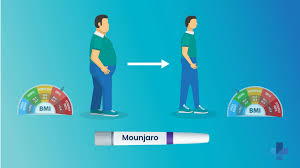Introduction: Understanding Ozempic and Mounjaro for Weight Loss
In the ever-evolving world of weight management, medications like Ozempic and Mounjaro have become increasingly popular for individuals seeking to lose weight. Both of these injectable medications, which contain the active ingredient semaglutide (Ozempic) and tirzepatide (Mounjaro KwikPen 2.5mg), are designed to help individuals with type 2 diabetes control their blood sugar levels. However, due to their weight-loss side effects, they have also gained attention as potential weight-loss tools for those struggling with obesity.
While these medications are effective in reducing weight, they come with certain risks that users must understand before embarking on their weight-loss journey. This blog will explore the potential risks associated with taking Ozempic and Mounjaro for weight loss, focusing on their side effects, long-term implications, and precautions that should be taken.
What Are Ozempic and Mounjaro?
Both Ozempic (semaglutide) and Mounjaro (tirzepatide) belong to a class of drugs called GLP-1 receptor agonists. They work by mimicking the effects of a natural hormone called GLP-1 that helps regulate blood sugar and appetite.
- Ozempic (semaglutide) was originally approved by the FDA for the treatment of type 2 diabetes. It reduces blood sugar by increasing insulin secretion, slowing gastric emptying, and reducing appetite.
- Mounjaro (tirzepatide), also FDA-approved for type 2 diabetes, is a newer medication that combines the effects of two hormones, GLP-1 and GIP (Gastric Inhibitory Polypeptide), which helps with both blood sugar control and appetite regulation.
Both medications have shown promising results in helping patients lose significant amounts of weight, leading to their increasing off-label use for obesity treatment.
Common Side Effects of Ozempic and Mounjaro
Like all medications, Ozempic and Mounjaro come with potential side effects. Some of these side effects are mild, while others can be more severe. Here’s a look at some of the most common risks associated with these drugs:
1. Gastrointestinal Issues
One of the most common side effects of both Ozempic and Mounjaro is gastrointestinal discomfort, including:
- Nausea
- Vomiting
- Diarrhea
- Constipation
- Abdominal pain
These symptoms often occur when starting the medication, but they may subside as the body adjusts. However, for some individuals, these side effects can be severe enough to lead to discontinuation of the drug.
2. Pancreatitis
There have been reports of pancreatitis (inflammation of the pancreas) in some individuals taking GLP-1 agonists like Ozempic and Mounjaro. Symptoms of pancreatitis include severe abdominal pain, nausea, and vomiting. This is a serious condition that requires immediate medical attention, and individuals with a history of pancreatitis or certain risk factors should exercise caution when using these medications.
3. Thyroid Cancers
Another significant risk associated with semaglutide (Ozempic) and tirzepatide (Mounjaro) is the potential for thyroid tumors. In animal studies, these medications have been shown to cause thyroid C-cell tumors, though it’s unclear whether this risk applies to humans. However, the FDA requires a black box warning for thyroid cancer for these medications, and individuals with a personal or family history of thyroid cancer or multiple endocrine neoplasia syndrome type 2 (MEN 2) are advised not to use them.
4. Kidney Issues
Both Ozempic and Mounjaro have been linked to kidney problems in some users, particularly those who experience severe dehydration from vomiting or diarrhea. In some rare cases, kidney damage can occur, leading to kidney failure. It is essential for users to stay hydrated and monitor kidney function throughout the treatment.
5. Hypoglycemia (Low Blood Sugar)
Although both medications are not typically associated with hypoglycemia (low blood sugar) in people without diabetes, when used in combination with other diabetes medications, the risk of low blood sugar increases. Individuals with type 2 diabetes who are using Ozempic or Mounjaro alongside insulin or sulfonylureas should be cautious of this risk.
6. Allergic Reactions
While rare, some individuals may experience allergic reactions to Ozempic or Mounjaro, including rashes, itching, swelling, or trouble breathing. If any signs of an allergic reaction appear, immediate medical attention should be sought.
Long-Term Risks of Ozempic and Mounjaro
While both medications show promising results for weight loss, their long-term effects remain uncertain. Here are some potential long-term risks:
1. Dependence on Medication
One of the potential long-term concerns with using Ozempic or Mounjaro for weight loss is the possibility of becoming dependent on the medication. Since both drugs regulate appetite and help with weight loss, there is a concern that individuals may struggle to maintain weight loss without the medication. The long-term dependence on these drugs could also lead to continuous side effects, such as gastrointestinal issues or the need for continuous injections.
2. Effects on Metabolic Health
While Ozempic and Mounjaro improve metabolic health by regulating blood sugar levels, long-term use could potentially disrupt other aspects of metabolism. As weight loss slows down, users might face challenges in maintaining muscle mass, which can affect overall health and metabolism.
3. Risk of Overweight Rebound
After discontinuing Ozempic or Mounjaro, there is a risk of regaining weight. Since these drugs control appetite and slow gastric emptying, stopping them could result in hunger pangs returning, leading to overeating and potentially regaining lost weight. A structured lifestyle plan involving exercise, diet, and behavioral changes is crucial to avoid this rebound effect.
Who Should Avoid Ozempic and Mounjaro?
Certain individuals should avoid taking Ozempic and Mounjaro due to the potential risks involved:
- People with a history of pancreatitis
- Individuals with thyroid cancer or family history of thyroid cancer
- Those with kidney disease or impaired kidney function
- Pregnant or breastfeeding women (Both drugs are not recommended during pregnancy or breastfeeding)
- Those with gastrointestinal conditions (e.g., gastroparesis)
Before starting either medication, individuals should discuss their medical history with their healthcare provider to ensure these drugs are safe for them.
Conclusion: Are Ozempic and Mounjaro Safe for Weight Loss?
Ozempic and Mounjaro are effective tools for weight loss, but they come with potential risks that must be carefully considered. Gastrointestinal issues, pancreatitis, and thyroid concerns are the most significant risks associated with these medications. Moreover, long-term use may lead to dependence on the drug, making it crucial for users to have a comprehensive weight-management plan that includes dietary and lifestyle changes.







